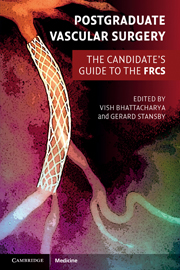Section 1 - Final FRCS vascular clinicals
Summary
The current format of the Final FRCS clinical examination for vascular candidates consists of both general surgery and vascular clinicals. These examinations have the same layout, and are taken on the same day. Each clinical consists of a series of five short stations taken in rapid succession. For each examination there are two examiners who will take turns in questioning and marking the candidate. The cases are either a patient encounter or interpreting an investigation. With the final examination being directed at ascertaining competence to become a consultant, the questions tend to relate to management issues rather than testing your ability to perform a head-to-toe clinical assessment. However, as senior trainees it is expected that you should know how to examine a patient in an orderly and effective fashion. Failure to demonstrate this in the clinical encounters will ring alarm bells with the examiners.
The short case format of the clinicals should not be viewed as a hurdle, but rather as an opportunity for you to impart your fundamental knowledge on a broad range of topics. The examination process is an efficient way of assessing a wide range of subjects in a limited period of time, in a systematic manner. Candidates who have gone through the clinicals are often left stunned by the number of topics that have been discussed in a blur of 30 minutes.
- Type
- Chapter
- Information
- Postgraduate Vascular SurgeryThe Candidate's Guide to the FRCS, pp. 1 - 2Publisher: Cambridge University PressPrint publication year: 2011



